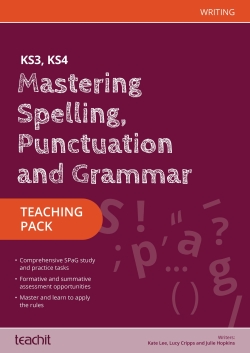Mastering spelling punctuation and grammar
KS3/4 Mastering spelling punctuation and grammar is a comprehensive SPaG teaching pack designed to help students master the essentials of SPaG and get them GCSE-ready.
Mastering spelling, punctuation and grammar contains:
- curriculum mapping and guidance for teachers along with further reading and/or useful links and references
- over 150 pages of worksheets, resources and activities
- spelling strategies, punctuation rules and grammar games to make the learning stick
- graphic organisers and A4 posters – perfect for consolidation and/or student revision
- formative assessments (including self and peer assessments)
- summative assessments (and suggested answers) to help teachers/students identify future learning targets.
As your ‘go-to’ SPaG pack, this will support you and your students from the start of KS3 up to GCSE.
Mastering spelling, punctuation and grammar covers the following:
Spelling
- spelling strategies and games
- the golden rules of spelling
- a spelling toolkit of approaches
- visualising spellings and connecting meaning
- approaches to recalling spellings
- spelling lists – KS3 and KS4
Punctuation
- punctuation recall (including A4 punctuation mark posters)
- an exploration of what punctuation is (and its future)
- full stops
- commas
- colons and semicolons
- punctuating clauses
Grammar
- using and controlling simple, compound and complex sentences
- statements, questions and imperatives
- the active and passive voice
- pronouns
- words that multi-task: verbs, nouns and adjectives
- prepositions and conjunctions
- adjectives and adverbs
- nouns and determiners
What's inside?
Spelling – Introduction for teachers – why spelling matters
Part 1
- Activity 1 – Spelling self-assessment – which spelling strategies work best for you?
- Activity 2 – Happy families – organise the groups of words
- Activity 3 – Spelling detectives – spot your clues
- Activity 4 – Master of the spelling universe – some golden rules of spelling
- Activity 5 – Spellers’ toolkit
Part 2
- Activity 1 – Visualising spellings and connecting meaning – graphic organiser
- Activity 2 – Recalling spellings I know – homophone challenge track
- Activity 3 – Practising spelling strategies – spelling HIIT workout
- Activity 4 – Playing spelling games – sink and destroy!
- Activity 5 – Summative assessment – check how much you know about spelling
Punctuation – Introduction for teachers – why punctuation matters
- Activity 1 – Punctuation recall
- Activity 2 – The cool stuff – what is punctuation?
- Activity 3 – The future of punctuation
- Activity 4 – The imitation game – full stops
- Activity 5 – Conquering commas
- Activity 6 – Spot the difference – colons or semicolons?
- Activity 7 – Clauses
- Activity 8 – Commas to place additional phrases at the front, middle and end of a sentence
- Activity 9 – Summative self-assessment / peer assessment activity
- Activity 10 – Summative assessment task – commas
- Activity 11 – Quick punctuation test
Grammar – Introduction for teachers – why grammar matters
- Activity 1 – What kind of sentence is it?
- Activity 2 – Using and controlling simple, compound and complex sentences
- Activity 3 – Statements, questions and imperatives
- Activity 4 – The active and passive voices
- Activity 5 – Pronouns
- Activity 6 – Words that multitask – verbs, nouns and adjectives
- Activity 7 – Prepositions and conjunctions
- Activity 8 – Assess your knowledge of adjectives and adverbs
- Activity 9 – Nouns
- Activity 10 – Summative assessment – grammar
About the teaching pack writers:
Lucy Cripps is an experienced former teacher and the author of Actually, the Comma Goes Here. Now an editor, proofreader and writer, she also the course director of Write Your Website at the Professional Writing Academy.
Julie Hopkins is an experienced English and EFL teacher and tutor, and a freelance copy editor.
Kate Lee is a former Head of English with over 10 years of experience in the classroom.
This sample shows a student activity for working on spelling from KS3/4 Mastering spelling punctuation and grammar:
Playing spelling games
Sink and destroy!
Playing in pairs, add five of your tricky spellings to the spelling battleship game grid below. Try to choose words of different lengths if possible.
Take it in turns to guess a coordinate to sink your partner’s ‘ship’ (their spelling words). For example, you would say A-1 or F-10, and they would say ‘hit’ or ‘miss’.
Next steps
Hide your battleship game cards. Can you remember the spellings of your five words and your partner’s five words?
Homework or extension
Create your own spelling board game or research, download and play a spelling app. Come prepared to briefly review the app for the class or to share your game idea.
All reviews
Have you used this resource?
Review this resource07/10/2021
10/08/2021
21/07/2021
10/07/2021
06/07/2021
05/07/2021

